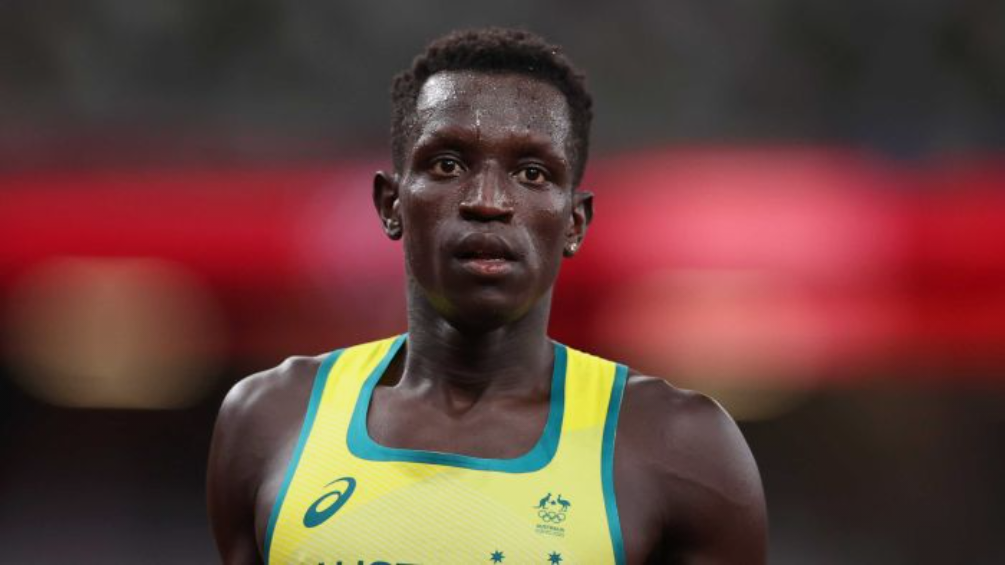Isn’t being an Olympian enough? The curious case of Peter Bol

Peter Bol finished fourth in the finals of the men’s 800 metres at the Tokyo Olympic Games. (Photo by Cameron Spencer/Getty Images)
In summary
Following his performance at the Tokyo Olympics, Peter Bol's backstory was emphasised by migration advocates. Opinion for the ABC by Stephane Shepherd, Swinburne University of Technology.
Stories of heroism and exceptionalism make for good reading. And intriguing commentary. Several such pieces were written following Peter Bol’s impressive achievements at the 2020 Olympic Games in Tokyo last week. Yet, for many, Bol’s feats on the athletics track carried much broader socio-political significance.
Bol’s backstory, which saw him arrive in Australia as a child from South Sudan by means of Egypt, was emphasised by migration advocates. Others felt that his accomplishments need not be tethered to his refugee background — a curiosity not imposed on other athletes. We were also reminded that the sporting arena is often a pathway to acceptance for migrants to Australia. While others felt that rare success should not be the threshold by which such individuals are culturally embraced.
All these points are valid. They also demonstrate that this individual sporting accomplishment was perceived to be more than simply a sporting accomplishment. It stirred feel-good parochialism. It invited an opportunity for reflection. It generated passions, tensions, and contradictions. And its symbolism instantly converted into advocacy. An athletic feat prompted a sprawling analysis that obscured more than it revealed.
Australians from migrant backgrounds are an evidently wide-ranging population. Some are reluctant to have their journey to Australia over-emphasised. Some perceive their emergence and efforts in Australia as more pivotal to their lives than earlier challenges overseas. And for many, adversities are not solely suffered before arriving in Australia — they are also endured and overcome locally. In this country, we disproportionately celebrate sporting prowess over other forms of achievement. This is particularly pronounced for populations of African descent, a trope with uncomfortable histories in other parts of the world. African-Australian success stories, of course, can take many forms.
In many ways this speaks to the complexities of covering the exploits of Australians from culturally and linguistically diverse backgrounds. Individual achievements inadvertently become assessments on entire communities. Individual achievements conceal the varied experiences of those with similar backgrounds. They also become the vehicle for broader social statements and sentiments. Sometimes these gestures are necessary to progress important conversations. Sometimes they saddle a simple moment of triumph with unreasonable expectations. Sometimes the narrative outruns the athlete.
The first Australian to make an 800m final in over fifty years seemed to take it all in his stride, navigating these fascinations and the weight of symbolism with remarkable poise and maturity. Viewed as a metaphor by others, Peter Bol himself appealed directly to his craft, his work ethic, and the country that supported him.
An Olympian can change narratives. Or perhaps just being an Olympian, for now, is enough.
This article is republished from the ABC under a Creative Commons license. Read the original article.
-
Media Enquiries
Related articles
-

- Technology
- Health
New MedTechVic prototypes to transform everyday lives of people with a disability
Swinburne’s MedTechVic has revealed three new prototypes designed through the joint Health-led Manufacturing Innovation Program, in partnership with the Australian Medtech Manufacturing Centre and Safer Care Victoria
Friday 19 July 2024 -

- Health
- Education
Dissociation is a common trauma response among many who seek therapy, but only one in five psychologists can accurately identify symptoms
New Swinburne research has found that four in five Australian psychologists have gaps in their knowledge on dissociation and cannot accurately identify dissociation symptoms.
Friday 21 June 2024 -

- Health
- Technology
Clinical Innovation Fellowships develop creative solutions to Australia’s healthcare challenges
MedTechVic is gearing up to begin its fourth year of the Clinical Innovation Fellowship Program (CIFP), following the highly successful third round in 2023.
Wednesday 19 June 2024 -

- Social Affairs
- Health
Swinburne leads world-first medical cannabis driving trial
Swinburne researchers are spearheading a world-first trial to evaluate whether patients can drive safely while on prescribed medical cannabis
Tuesday 28 May 2024 -

- Social Affairs
Swinburne is committed to reconciliation “Now More Than Ever”
Swinburne held events across our three campuses to mark National Sorry Day and National Reconciliation Week.
Friday 31 May 2024

